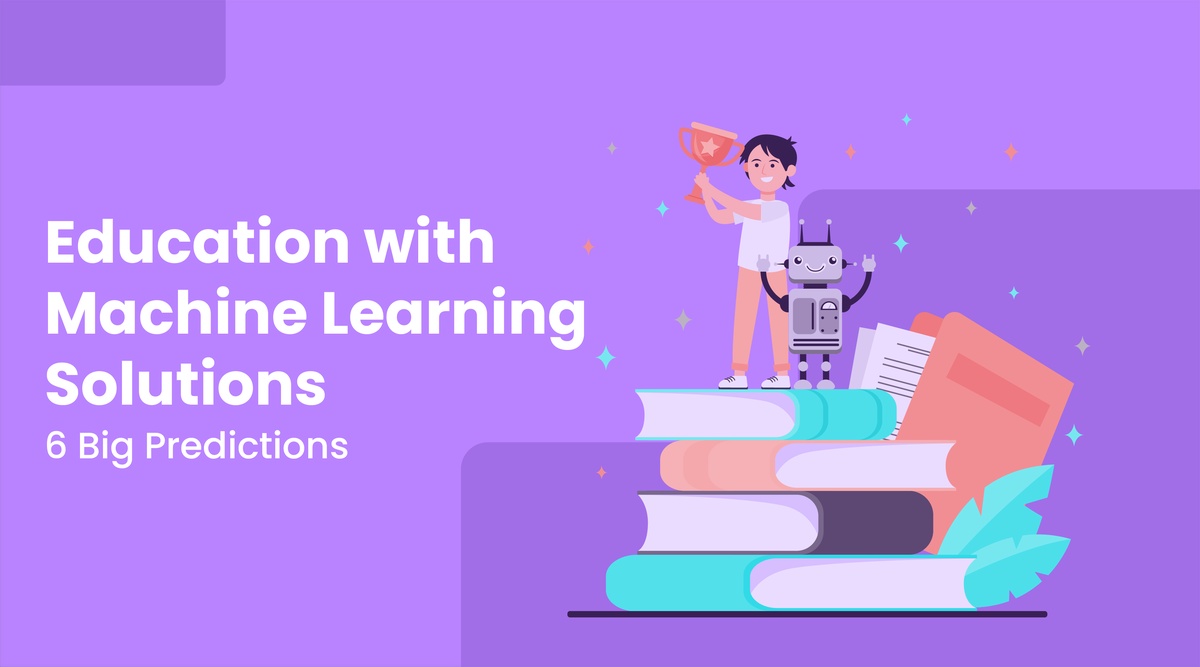Exploring the Cutting-Edge Intersection of Education and Technology: The Future of EdTech with Machine Learning
The field of education has undergone a significant transformation in recent years, with technology playing an increasingly important role in teaching and learning. From online learning platforms to interactive educational games, technology has made education more accessible, engaging, and personalized.
As we move into the future, Machine Learning is poised to play an even more prominent role in education. Machine Learning algorithms can analyze vast amounts of data to identify patterns, make predictions, and provide personalized feedback to students. In this post, we will explore the future of EdTech and the predictions for the role of Machine Learning in education.
We will look how Machine Learning is already transforming the education landscape and discuss the potential applications of this technology in the years to come. Whether you are an educator, student, or EdTech professional, this post will provide valuable insights into the future of education and the role of Machine Learning in shaping the same.
Revolutionizing Education with Machine Learning: Predictions for the Future of EdTech
#1 Personalized Learning:
Machine Learning can be a game-changer in personalizing learning for students. Machine Learning algorithms can analyze vast amounts of data and identify patterns to provide personalized learning experiences for students. ML can provide targeted recommendations and content to help students learn at their own pace and level by analyzing data such as student performance, learning styles, and preferences. This can help to improve student outcomes and engagement.
One of the examples could be if a student struggles with a particular topic, the algorithm can identify the gap and provide targeted resources to help the student overcome the challenge. This can significantly improve the student's learning outcomes and experience.
An adaptive learning platform like Dreambox uses Machine Learning to analyze student performance and adjust the difficulty of the content accordingly. This helps ensure that each student learns at their appropriate speed and level.
#2 Automated Assessment:
Assessment is a crucial aspect of the education system, but it can be time-consuming and challenging for teachers to evaluate each student's performance. Machine Learning can automate the grading process and provide more accurate and timely student feedback. Automated assessment can also help to identify areas where students may be struggling and provide targeted interventions to help them improve.
For instance, Machine Learning algorithms can evaluate assignments and tests, provide instant feedback, and even identify areas where the student needs improvement. This can free up teachers' time and enable them to focus more on personalized teaching.
EdTech platform Gradescope uses Machine Learning to grade handwritten assignments and provide instant feedback. This helps to reduce teachers' workload and allows them to impart more customized learning to their students.
#3 Predictive Analytics:
Machine Learning algorithms can analyze student data to predict academic performance, identify learning difficulties, and anticipate dropout rates. This information can help teachers and administrators intervene early to provide selected support to striving students. Predictive analytics can also enable schools to develop tailored learning plans for students, which can help to improve their grade levels.
The student success platform, Civitas Learning, uses Machine Learning to predict and analyze student performance history and help them achieve the key performance indicators. Hence, helping them achieve the best academic performance and increase their retention rate.
#4 Natural Language Processing:
Machine Learning driven education solutions can analyze student language patterns and provide personalized feedback. For example, ML can offer specialized feedback to help students improve their language skills by analyzing grammar and vocabulary usage data. Natural Language Processing can also be used to develop chatbots that can provide support and answer student queries.
The language learning app, Duolingo, uses Natural Language Processing to analyze students' language skills and offer custom learning to improve their dialect. NLP can also be used to develop chatbots that can solve students’ doubts and answer their inquiries, like the virtual assistant, Jill Watson, developed by Georgia Tech.
#5 Intelligent Tutoring Systems:
Machine Learning can be used to develop intelligent tutoring systems that provide individualized recommendations to students. ML-driven EdTech solutions can provide customized counseling, tips, and content to help students study at their own leisure. This is backed by analyzing data such as student performance, learning styles, and preferences. As a result, intelligent tutoring systems can improve student interest in studies and related.
An example of an ITS is Carnegie Learning's Math Tutor, used in K-12 schools in the United States. It uses Machine Learning algorithms to analyze student performance and provide specified learning to help students improve their Math skills. The system collects data on student interactions with the software, such as the types of problems they solve and the time they spend on each one of them.
It has been shown to improve student performance metrics and engagement. For example, a study by the RAND Corporation found that students who used the Math Tutor for one year had significantly higher Math achievement scores than those who did not use the software.
#6 Process Efficiency:
Teachers need a better system that takes care of everything and allows them to concentrate on a more important goal: spreading their expertise to the students or learners. The days when teachers struggled to keep separate logs for each of their students are long gone.
One of the main advantages of Machine Learning in education is that machines have taken over the workload by methodically organizing content and managing the daily curriculum of the teachers. The outcome is clear: students do incredibly better and teachers educate effectively.
The gap between students and teachers is another area of education where Machine Learning is crucial. The automatic system will make appointments for students based on their regular schedules and those of the teachers, so they won't have to chase them down.
For instance, the web platform Netex Learning uses Machine Learning to enable teachers to create daily lesson plans. The best aspect is that teachers already have the power to structure their lesson plans around content that includes audio, video, custom assignments, and discussion forums.
The Future of Education is Here: Embracing Machine Learning to Revolutionize Learning and Teaching
The role of Machine Learning in EdTech is still in its early stages, but its potential to transform the way we teach and learn is enormous. With personalized learning, automated assessment, predictive analytics, and Natural Language Processing, Machine Learning can provide students with a more individualized and effective learning experience. As technology advances and becomes more accessible, we expect rapid growth in adopting Machine Learning in education
Machine Learning can transform how education is delivered and how students learn. By leveraging the power of Machine Learning techniques, education can become more distinctive, intriguing, and effective. However, it is essential to note that Machine Learning is not a silver bullet and requires careful implementation and monitoring to ensure it delivers the desired outcomes.
At Quixom, we offer comprehensive Python Machine Learning Solutions to help education providers integrate Machine Learning techniques into their systems. We understand the importance of data privacy and security in education, and our solutions are designed to ensure the safety and confidentiality of student data. With our Python Machine Learning Solutions, education providers can unlock the full potential of Machine Learning to create stimulating, unique learning experiences for students. Contact us to learn more about how our solutions can benefit your institution.


Comments (2)